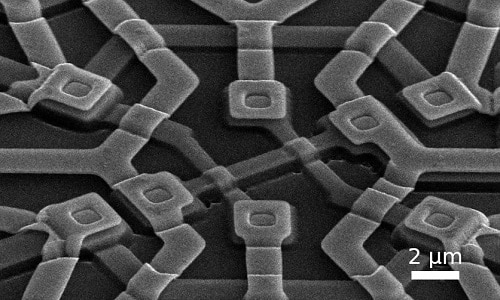Superconducting processors could speed up traditional supercomputers and remarkably cut their power consumption

The processing power of a quantum computer is based on superconducting qubits operated at extremely low temperatures. Qubits are typically controlled by conventional electronics at room temperature, connected through electrical cables. When the number of qubits eventually rises to the required level of hundreds of thousands, the number of control cables will hardly scale to match the number of qubits, without leading to an unbearable heat load and thus spoiling the low temperature of the quantum processor.
One solution is to control the quantum processor with a nearby classical processor. The most promising solution is to utilise the single flux quantum (SFQ) technology, which follows traditional computers in logic but uses superconducting technology instead of semiconductors. Requiring low temperatures, SFQ has been rarely used in traditional computers. This disadvantage however turns into an advantage when used in combination with superconducting quantum computers.
One major challenge remains. Calculation instructions come to the SFQ processor from a conventional supercomputer, and calculation results must be sent back from the SFQ processor to the same machine. This requires data transfer between extremely low temperatures and room temperatures.
“Our vision is to replace electrical cables with optical fibres and suitable converters, which convert optical signals to electrical signals, and vice versa. Unlike existing solutions, these components must be able to operate at low temperatures. The main goal is to develop novel converters and to demonstrate how they can drive and read out a simple SFQ processor,” says Matteo Cherchi, Senior Scientist at VTT, coordinator of the project. VTT is presently developing the Finnish quantum computer in collaboration with the Finnish start-up IQM. Even though the short-term goal of the collaboration is to reach about 50 qubits only, with aCryComm VTT intends to lay the foundation for a long-term development towards much more powerful quantum computers.
Powering Conventional Supercomputers
Besides quantum computers, conventional supercomputers can also benefit from the development of optical connections for SFQ technology. In a typical supercomputer or any laptop or smartphone, graphic processing units (GPU) support the central processing unit (CPU) in 3D rendering and similar computational tasks. GPUs are particularly suitable for vector and matrix calculations that are at the core of various scientific calculations.
A major limitation of supercomputers is the extremely high power consumption of CPUs and GPUs due to the energy dissipation in silicon chips. Replacing silicon chips with superconducting SFQ chips in GPUs could have a notable impact on both the performance and the power consumption of supercomputers.
Boosting the supercomputers will boost weather forecasts, analysis of climate change, drug development, material development and logistics, just to mention a few.










